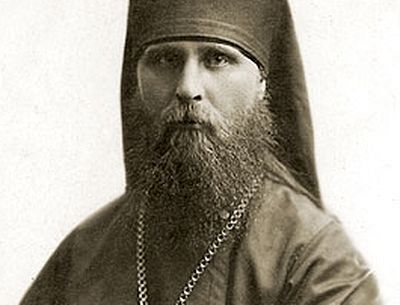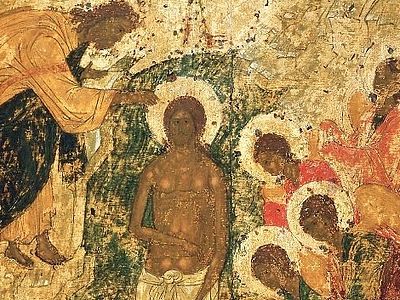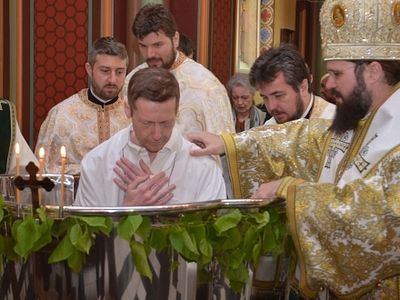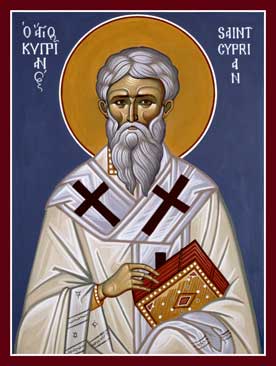
Saint Cyprian of Carthage developed with fearless consistency a doctrine of the complete absence of Grace in every sect which had separated itself from the True Church. His doctrine is one of the basic foundation blocks of Orthodox ecclesiology and it stands in direct opposition to the presuppositions of the ecumenical movement. Moreover, his warnings about the enemies of the Church have traditionally guided Orthodox in their response to those outside Her fold:
Not only must we beware of what is open and manifest, but also what deceives by the craft of subtle fraud. And what can be more crafty, or what more subtle, than for this enemy...to devise a new fraud, and under the very title of the Christian name to deceive the incautious.[1]
Saint Cyprian’s warnings about enemies of the Church who call themselves "Christians" in order to destroy the Faith can be applied to many of those who support unity through the contemporary ecumenical movement. The fact that such application is seldom made gives us evidence of just how far contemporary ecumenism has removed some Orthodox from the criterion of truth that is their Faith.
The essence of Saint Cyprian’s reasoning lay "in the conviction that the sacraments are established in the Church." That is to say, they are effected and can be effected only in the Church, in communion and in communality. Therefore, every violation of communality and unity in itself leads immediately beyond the last barrier into some decisive outside. To Saint Cyprian every schism was a departure out of the Church, out of that sanctified and holy land "where alone rises the baptismal spring, the waters of salvation."[2] Saint Cyprian was adamant in his position with regard to the Church’s rejection of the validity of an heretical sacrament:
For it is no small and insignificant matter which is conceded to heretics, when their baptism is recognized by us; since thence springs the whole origin of faith and the saving access to the hope of life eternal. And the divine condescension for purifying and quickening the servants of God. For if any one could be baptized among heretics, certainly he could also obtain remission of sins. If he attained remission of sins, he was also sanctified.[3]
Saint Cyprian felt that if the True Church recognizes the sacraments of those outside of Her realm, She gives credibility to heretics and schismatics:
For if they shall see that it is determined and decreed by our judgement and sentence, that the baptism wherewith they are there baptized is considered just and legitimately in possession of the Church also, and the other gifts of the Church; nor will there be any reason for their coming to us, when, as they have baptism, they seem also to have the rest. But further, when they know that there is no baptism without, and that no remission of sins can be given outside of the Church, they more eagerly and readily hasten to us, and implore the gifts and benefits of the Church, our Mother, assured that they can in no wise attain to the true promise of divine grace unless they first come to the Truth of the Church.[4]
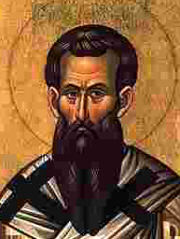 St. Basil the Great
St. Basil the Great
Thus, there are those who quite wrongly think that the Church has in some instances acknowledged that the sacraments of sectarians, and even of heretics, are valid. They wrongly assume that the Church admits that sacraments can be celebrated outside of the strict canonical limits of the Church—a perilous assumption, indeed. The Church, for example, may under extraordinary circumstances accept adherents from sects, and even from heresies, not by way of Baptism, but rather by Chrismation or even by their simple profession of our Orthodox Faith. But in so doing, She does not recognize, as some theologians incorrectly assert, what is outside Her domain; rather, by "economy," the Church, being the Pan–Mystery, as Archimandrite Justin expresses it, creates Grace where there was no Grace, filling the empty form of a mystery (sacrament) unknown to Her. At the same time, before the emergence of whole bodies of Christians separated from the historical Orthodox Church, there were times when those who had lapsed in their Faith even for a generation were received back into the Church without being Baptized. But here, too, it was the correct form of their empty mysteries which the Church accepted, not the validity of their sacraments. By "economy," then, the primacy of the Church was extended beyond Herself to create Grace in what was done outside Her boundaries. But in so doing, in no way whatsoever did She accept what was beyond Her boundaries. She acted beyond the Canons, but not in violation of them:
As a mystical organism, as the sacramental Body of Christ, the Church cannot be adequately described in canonical terms or categories alone. It is impossible to state or discern the true limits of the Church simply by canonical signs or marks.... In her sacramental, mysterious existence the Church surpasses canonical measurements. For that reason a canonical cleavage does not immediately signify mystical impoverishment and desolation. All that Saint Cyprian said about the unity of the Church and the sacraments can be and must be accepted. But it is not necessary, as he did, to draw the final boundary around the body of the Church by canonical points alone.[6]
Saint Augustine of Hippo, espousing opinions clearly outside the consensus of the Church Fathers, wrote that within the sects and divisions of Christianity the "union of peace" had been broken and torn asunder, but in their mysteries the "unity of the Spirit" had not been terminated. This shows, as Father Florovsky observes, "the unique paradox of sectarian existence: the sect remains united with the Church in the grace of the sacraments, and this becomes a condemnation once love and communal mutuality have withered."[7] Thus, Saint Augustine directly affirmed "that in the sacraments of sectarians, the Church is active; some she engenders of herself, others she engenders outside, of her maid–servant, and schismatic baptism is valid for this very reason, that it is performed by the Church."[8] According to Saint Augustine, then, "the Holy and Sanctifying Spirit still breathes in the sects, but in the stubbornness and powerlessness of schism healing is not accomplished."[9]
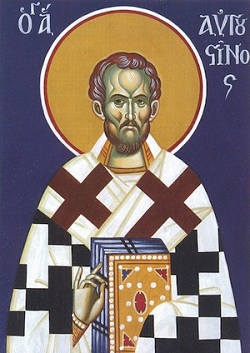 St. Augustine
St. Augustine
At the same time, it is wrong for "conservatives" to interpret the words of Saint Augustine in such a way as to suggest that the Orthodox Church compromises the Providence of God. The Church has always affirmed the dominance of love within the confines of Her exclusive claims that only in Her bosom does salvation rest. Because of God’s love, the Orthodox Church can at once proclaim that salvation is possible only for Orthodox Christians and, at the same time, refuse to compromise Divine Providence by condemning all others to damnation. And because of the love which prompts the Church in Her mission, She at times reaches out in the spirit of "economy" to fill with Her exclusive Grace the empty forms of non–Orthodox religious acts. In so doing, however, the Orthodox Church never, until the advent of ecumenism, acknowledged the validity of any sacrament outside Her boundaries.
In many ways, the Orthodox Church cannot accept the precepts of modern ecumenism because they also violate the spiritual teachings of the Fathers about personal integrity as a foundation for ecclesiastical validity. In the fourth century, Saint Ephraim the Syrian said, "Pride does not permit a man to accept the teachings handed down by Tradition."[10] The Orthodox tend to see separation and disunity in Christianity not as the result of a tragic process of mutual alienation, but of pride and sin. Thus, the second major schism in Christianity, the Great Schism of 1054, can be seen in the following way:
By the anathema against papism the Church proclaimed that the pope and his followers abandoned the Church, lost the Truth (which is Christ), and were submerged in the depths of error from which Christ came to free them. Their teachings were declared a delusion of the Evil One, and a poison to the souls of men, and any communication with them makes us like them by cutting us off from the Grace of God, from His Holy Church, and estranges us from the path of salvation, placing us rather on the road to perdition.[11]
The root causes of heresy and schism, then, are the intransigence and sin of prideful men. Heresy and schism do not just happen; they are caused. They rise out of spiritual delusion, spiritual disease, and alienation from the ways of God and His Church. Deviation from Orthodox Truth in the form of ecumenical activities has had a negative effect on the Church, as though to prove that schism and heresy are not the products of misunderstanding, but of the willful deviation of wrong believers from the True Church. For instance, Orthodox theologians have come to reject the Canons of the Church, so that they can justify their ecumenism. Thus the late Archpriest John Meyendorff, a well–known spokesman for Orthodox in America, dismisses the Canons which forbid joint prayer with heretics as archaic and no longer applicable to the Church. He claims that these Canons were intended to apply to prayer with conscious apostates from the True Church, "and not sincere Christians who never personally left it."[12] Thus individual responsibility for wrong belief becomes an inessential part of Christian confession—a novel idea, indeed. By the same token, not a few Orthodox theologians and Hierarchs are beginning to see a place for Orthodoxy in the ecumenical "branch theory."
While claiming to love the Orthodox Faith, they violate their promises at Ordination to defend the Truth and instead openly state that the Orthodox Church is just as guilty of divisiveness as the heretics and schismatics who separated themselves from the Church of their own free will. Again, to hold such views or to participate in ecumenical activities which champion such ideas is to deny the existence of the True Church and Christ’s earthly presence. Thus one who participates in such ecumenism perforce denies Christ.[13] Ecumenism, in short, has led many Orthodox to deny the very existence of Christ as we Orthodox understand Him.
* * *
From Orthodox Christianity and the Spirit of Contemporary Ecumenism, by Fr. Daniel Degyansky. (Etna: CA, The Center for Traditionalist Orthodox Studies, 1997 [1992]), pp. 76-83. Fr. Daniel is a Priest in the Orthodox Church in America (OCA).
